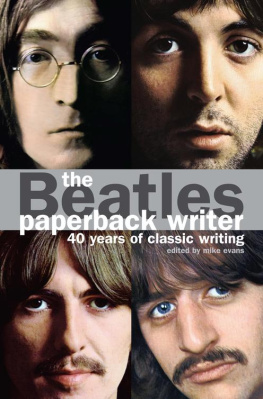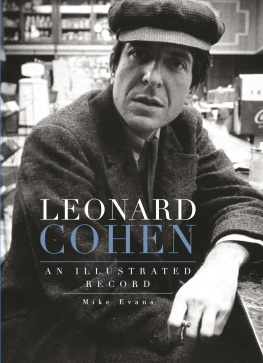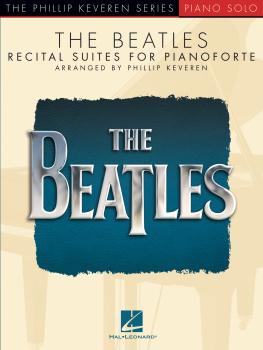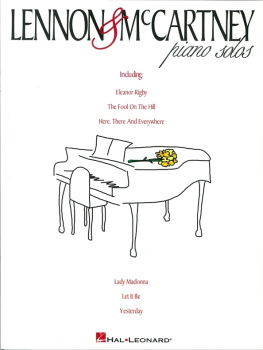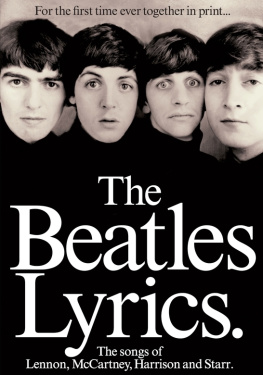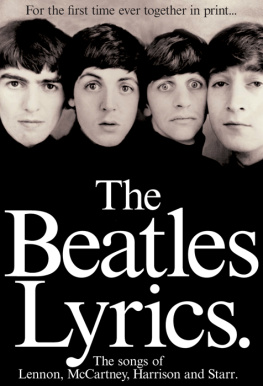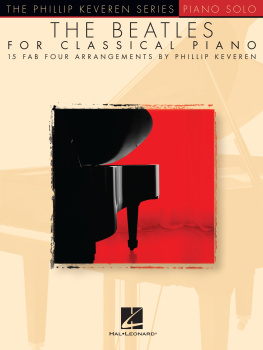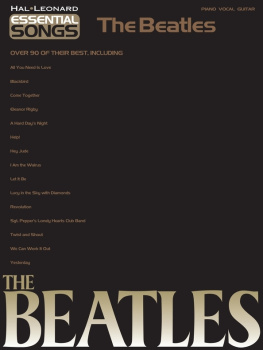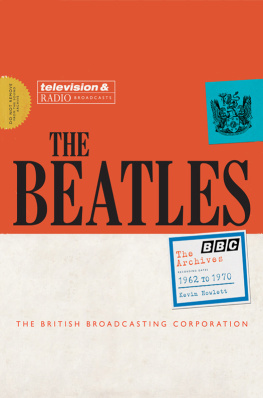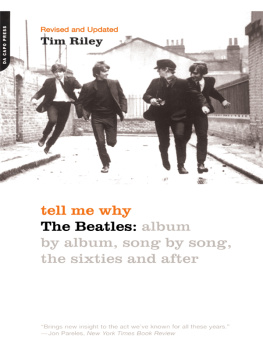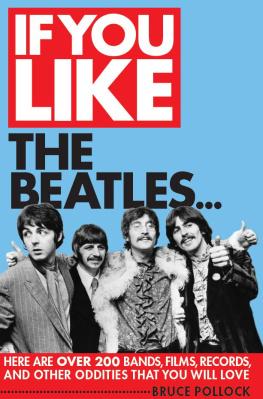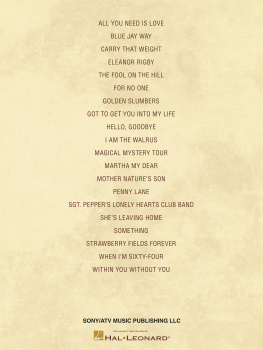Mike Evans - The Beatles
Here you can read online Mike Evans - The Beatles full text of the book (entire story) in english for free. Download pdf and epub, get meaning, cover and reviews about this ebook. year: 2014, publisher: Plexus Publishing Ltd., genre: Detective and thriller. Description of the work, (preface) as well as reviews are available. Best literature library LitArk.com created for fans of good reading and offers a wide selection of genres:
Romance novel
Science fiction
Adventure
Detective
Science
History
Home and family
Prose
Art
Politics
Computer
Non-fiction
Religion
Business
Children
Humor
Choose a favorite category and find really read worthwhile books. Enjoy immersion in the world of imagination, feel the emotions of the characters or learn something new for yourself, make an fascinating discovery.
- Book:The Beatles
- Author:
- Publisher:Plexus Publishing Ltd.
- Genre:
- Year:2014
- Rating:4 / 5
- Favourites:Add to favourites
- Your mark:
- 80
- 1
- 2
- 3
- 4
- 5
The Beatles: summary, description and annotation
We offer to read an annotation, description, summary or preface (depends on what the author of the book "The Beatles" wrote himself). If you haven't found the necessary information about the book — write in the comments, we will try to find it.
The Beatles — read online for free the complete book (whole text) full work
Below is the text of the book, divided by pages. System saving the place of the last page read, allows you to conveniently read the book "The Beatles" online for free, without having to search again every time where you left off. Put a bookmark, and you can go to the page where you finished reading at any time.
Font size:
Interval:
Bookmark:
Once upon a time there were three little boys called John, George and Paul, by name christened all of a sudden they all grew guitars and formed a noise on discovering a fourth little even littler man called Stuart Sutcliffe running about them they said, quote Sonny get a bass guitar and you will be alright So they sat on him with comfort til he could play.
- John Lennon from Being a Short Diversion on the Dubious Origins of Beatles, 1961
In 1957, the painter Richard Hamilton (who later designed the collage insert in the Beatles White Album) famously defined all things Pop as popular, transient, expendable, low cost, mass produced, young, witty, sexy, gimmicky, glamorous and big business. This description was particularly applicable to pop music. Yet as pop artists such as Hamilton appropriated the transient imagery of comic books and advertising, rendering them permanent, so the attention of critics and writers signalled a point at which pop music began to be taken seriously. This radical change in attitude was catalysed by the Beatles.
Before the Beatles, at the beginning of the Sixties, no one in the serious press paid attention to rocknroll. There were no books tracing its (admittedly very short) history, and music critics never gave the popular mass-market a second thought. The weekly music press in England was divided, between the throwaway pop coverage of the New Musical Express and the jazz-dominated Melody Maker. In America, likewise, the jazz fraternity had Downbeat magazine, but there was no contemporary equivalent of the later Rolling Stone. In the space of one decade, the advent of the Beatles would change all this.
It seemed to me that pop had come of age, wrote critic George Melly on first hearing Paul McCartneys Eleanor Rigby. As the Beatles began to transcend the traditional confines of pop music, so an ostensibly more cultured and literate audience sat up and took notice. There were other forces in play, of course. Bob Dylans lyrics had become progressively more poetic since his first albums in the early Sixties. Indeed, by the time of the Beatles 1966 Revolver album (where Eleanor Rigby first appeared), John Lennon, in particular, had clearly come under his influence. Dylan, however, was first and foremost an albums artist. However significant the changes he brought to rock music, he couldnt impact upon the mainstream in the way that the overtly populist Beatles did.
Populism was the sign of the times not only in music, but in the popular and commercial arts generally. Nineteen-sixties Britain saw a democratisation of culture. Painting, fashion, photography, journalism and filmmaking all gave rise to a new generation who displaced the old elite. David Hockney, Michael Caine and David Bailey all came, like the Beatles, from modest backgrounds. These were the new movers and shakers who, in turn, informed the new opinion makers.
So it was that highbrow met lowbrow, as one American commentator put it. For the groups unprecedented influence on the other side of the Atlantic not just on the US charts, but on the American psyche ensured that of the many thousands of column inches devoted to the Beatles throughout the world, a vast number originated in the United States. And it wasnt just the music journalists who had them in their spotlight. Fashion gurus, film critics, sociologists, psychologists and political commentators all got in on the act.
During the eight short years that marked their career as a recording group, however, only a couple of biographies of the group saw publication: Michael Brauns Love Me Do: The Beatles Progress the only serious account written during the first year of Beatlemania and the authorised (but inevitably sanitised) biography by Hunter Davies. There were also two literary efforts by John Lennon In His Own Write and A Spaniard in the Works which immediately made him the toast of that social group the English call the chattering classes.
But, after the Beatles break-up, the trickle of books became a flood. From the familiar story of their progress from Hamburg cellars to superstardom to in-depth musical analyses, every possible angle was covered. For every straight biography there was a score of I was there recollections by friends and family, ex-colleagues, or even fans; for every realistic assessment of them as a rocknroll band, there was some pretentious highbrow critic trying to justify his liking for the Beatles.
Within these pages is a cross section of the very many words written about the Beatles over the years. They range from contemporary reviews to considered retrospective accounts, from thought-provoking challenges to our popular perception of John, Paul, George and Ringo to cynical put-downs by shortsighted pundits. The Beatles often courted controversy Were more popular than Jesus now, John blithely claimed but they also stimulated debate (particularly in their candid admissions of drug use), faced the very real physical dangers of Beatlemania and ultimately, in Johns case, suffered an untimely death. (As did original bassist Stuart Sutcliffe, and manager Brian Epstein.)
The significance of the Beatles not only in terms of their effect on popular music, but also in their impact upon social mores and attitudes cannot be overestimated. They emerged from an austere post-war Britain, completely under the shadow of US popular culture. British youth had found a necessary escape from drab surroundings in American movies, street fashion and rocknroll. Less than a decade on, the Beatles had turned the tables: an affluent Britain began to dominate pop culture across the globe, and directly triggered a youth revolution whose impact is still felt over 30 years later.
Mike Evans
London
By Ray Connolly
As an early 1940s war baby, who grew up in the working-class north-west of England, journalist Connolly had a similar background to the Beatles. This extract from his 1981 biography of Lennon displays an authentic feel for 1950s teen culture.
Against her better judgement, [Aunt] Mimi bought John his first guitar. (It was once thought that Julia [Johns mother] was the benevolent encourager of young talent. It is certainly a more romantic notion, and one which would have appealed to John, but it was almost certainly a reluctant Mimi who actually nurtured a growing obsession with a cheap Spanish guitar.) Ten years earlier, Elvis Presleys father had admonished his son with the advice that he never knew a guitar player who ever made a dime; now Mimi was to take up the refrain: The guitars all right, John. But youll never make a living with it.
Even if Julia did not actually buy that first guitar it was certainly she who taught John the first chords he was to play. As a girl she had sung and played banjo, and it was banjo chords that she taught John. By now he was sixteen and in his final year at Quarry Bank. All ambitious boys were already swotting for their GCEs which took place the following June, but John Lennon was busy forming his own group. Naturally enough he called it the Quarrymen, and it comprised any of the boys in his school gang who showed any musical ability and several who didnt. The personnel changed by the week as John rowed first with one and then another. If youd been in my class at school Id have had you in the Quarrymen, he later told me. I would have made you join to rebel against your mother. Anyone who liked rock and roll could join. John, of course, was the leader of the group. He didnt know any other way. From childhood he had always assumed an attitude of natural superiority.
Throughout that final year at school John wandered deeper into the world of rock music. Again it was an American culture which was being imposed from outside. It was a full year before Cliff Richard came up with Move It, a full year before any British act would make a proper rock and roll record, and it was nearly a year before John would meet Paul McCartney. For a year, while the embryonic Quarrymen larked about with John practising in the porch of his home, the craze grew, and the newspapers began to devote more and more space to this new phenomenon, linking it with violence and the screen rebel heroes of James Dean (who was dead before Elvis even had a hit record) and Marlon Brando. At night, instead of doing his homework, John would tune the family radio in to the weak signal of AFN Munich so that he could hear the new American records before anybody else, or he would listen to the more accessible Radio Luxembourg. (The BBC took a dim view of rock and roll music and devoted as little time to it as was humanly possible in those days.) By this time John was beginning to dress in the Teddy Boy style of the times, tight trousers and greasy hair swept back and up into a pompadour on top of his head. Poor Mimi suffered it all, but never in silence.
Font size:
Interval:
Bookmark:
Similar books «The Beatles»
Look at similar books to The Beatles. We have selected literature similar in name and meaning in the hope of providing readers with more options to find new, interesting, not yet read works.
Discussion, reviews of the book The Beatles and just readers' own opinions. Leave your comments, write what you think about the work, its meaning or the main characters. Specify what exactly you liked and what you didn't like, and why you think so.

